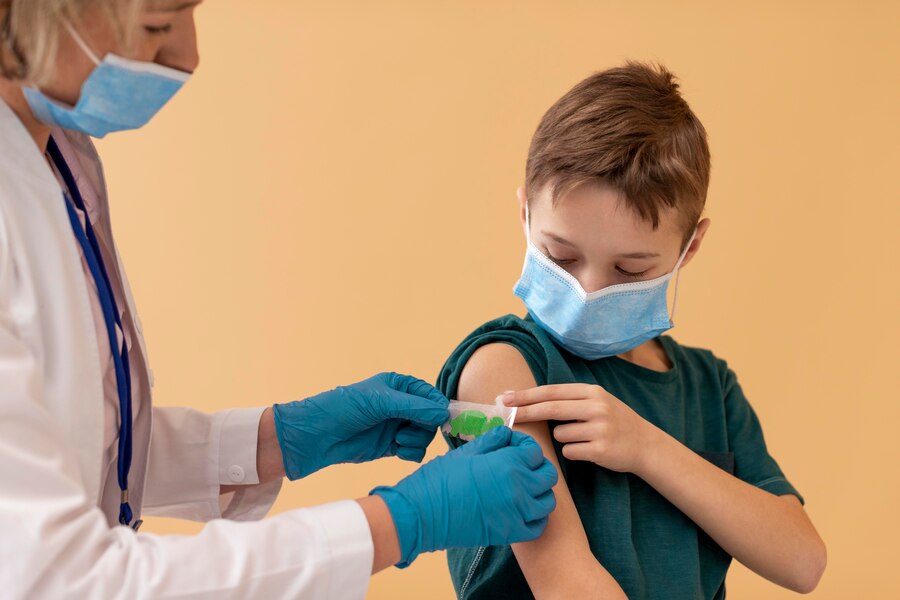Vaccination for children is one of the most effective ways to protect against serious illnesses and infectious diseases. Immunization plays a crucial role in strengthening a child’s immune system, reducing the spread of diseases, and promoting long-term health. This article explores the importance, types, schedule, and benefits of childhood vaccination.
Importance of Vaccination for Children
Vaccination is a medical process where a child is given a vaccine to stimulate their immune system to produce antibodies. These antibodies help protect against diseases without the child needing to suffer from the illness.
Why Vaccination is Essential for Children
- Prevents Deadly Diseases: Vaccines protect children from life-threatening diseases like measles, polio, whooping cough, and hepatitis.
- Reduces Disease Transmission: Vaccination not only safeguards the child but also prevents the spread of infections to others.
- Boosts Immunity: Immunization strengthens the child’s natural defenses, making them more resilient to infections.
- Saves Lives: Childhood vaccination programs have significantly reduced mortality rates related to preventable diseases.
- Cost-Effective: Vaccines reduce healthcare costs by preventing the need for expensive medical treatments.
Types of Vaccines for Children
Routine Childhood Vaccines
- Hepatitis B Vaccine: Protects against hepatitis B infection, which can cause liver disease.
- DTaP (Diphtheria, Tetanus, Pertussis): Prevents three severe bacterial infections.
- Hib (Haemophilus Influenzae Type B): Guards against severe bacterial infections like meningitis and pneumonia.
- Polio Vaccine (IPV/OPV): Helps eradicate poliovirus.
- MMR (Measles, Mumps, Rubella): Provides immunity against three common viral infections.
- Varicella (Chickenpox) Vaccine: Protects against chickenpox and its complications.
- Pneumococcal Vaccine (PCV): Prevents pneumonia, meningitis, and bloodstream infections.
- Rotavirus Vaccine: Shields against severe diarrhea and dehydration in infants.
- Influenza Vaccine: Offers protection against seasonal flu.
Additional Recommended Vaccines
- Hepatitis A Vaccine: Protects against liver infections caused by the hepatitis A virus.
- Meningococcal Vaccine: Prevents bacterial meningitis, a severe brain infection.
- HPV Vaccine: Recommended for adolescents to prevent cervical and other cancers caused by the human papillomavirus.
Childhood Vaccination Schedule

Birth to 6 Months
- At Birth: Hepatitis B (1st dose)
- 2 Months: DTaP, Hib, IPV, PCV, Rotavirus, Hepatitis B (2nd dose)
- 4 Months: DTaP, Hib, IPV, PCV, Rotavirus (2nd dose)
- 6 Months: DTaP, Hib, IPV, PCV, Rotavirus, Hepatitis B (3rd dose), Influenza (yearly)
12 Months to 6 Years
- 12-15 Months: MMR, Varicella, Hepatitis A (1st dose), Hib, PCV
- 18 Months: Hepatitis A (2nd dose)
- 4-6 Years: DTaP, IPV, MMR, Varicella
7-18 Years
- 11-12 Years: Tdap, HPV, Meningococcal
- 16-18 Years: Meningococcal (booster)
Benefits of Vaccination for Children
- Protecting Children from Deadly Diseases
Vaccination has significantly reduced the prevalence of deadly diseases. For instance, polio, which once caused severe paralysis, has been nearly eradicated due to global immunization efforts.
- Herd Immunity
When a large percentage of the population is vaccinated, it provides indirect protection to those who cannot receive vaccines due to medical conditions.
- Long-Term Health Benefits
Childhood vaccination helps prevent chronic diseases, reducing the likelihood of long-term complications from infections.
- Global Impact
Immunization campaigns have helped eradicate diseases like smallpox and continue to prevent outbreaks of other infections worldwide.
FAQ (Frequently Asked Questions)
1. Why are childhood vaccinations important?
Vaccines protect children from severe illnesses, strengthen immunity, and prevent outbreaks of contagious diseases.
2. Are vaccines mandatory for children?
While vaccination requirements vary by country, most governments recommend and enforce immunization programs to prevent disease outbreaks.
3. What are the side effects of childhood vaccines?
Common side effects include mild fever, swelling, or soreness at the injection site. Severe reactions are extremely rare.
4. Can vaccines overload a child’s immune system?
No, a child’s immune system is capable of handling multiple vaccines at once without any adverse effects.
5. What should I do if my child misses a vaccine dose?
Consult your doctor to reschedule the missed vaccine and ensure your child stays on track with their immunization schedule.
Conclusion
Vaccination for children is a cornerstone of public health, preventing serious diseases, ensuring long-term immunity, and contributing to global disease eradication efforts. Parents should adhere to the recommended immunization schedule to protect their child’s health and the community. By staying informed and following medical guidelines, we can create a safer and healthier future for the next generation.
Schedule an appointment with our clinic for Children Vaccination (469) 200-5974 or visit us https://scclittleelm.com/

